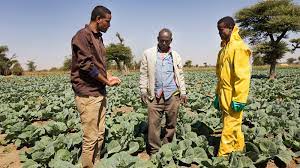Ethiopia has initiated a process to sign the African Risk Capacity Treaty and an MoU with insurers ARC Ltd and PULA in a bid to de-risk its smallholder farmers.
The latest move, according to Ethiopia’s Minister of agriculture, Oumer Hussein, intends to help smallholder farmers better prepare, plan and respond to extreme weather events, and other risks.
Most smallholders in Ethiopia rely on rain-fed agriculture, leaving them vulnerable to the impact of agricultural and climatic risks while proposing the African Risk Capacity Treaty in a bid to de-risk its smallholder farmers.
The country’s exposure to desert locusts further threatens the national economy, prompting authorities to seek pre-emptive strategies.
“Ethiopia’s hazard profile is dominated by various risks such as droughts, floods, desert locusts, and diseases that result in hunger and conflicts,” said Ethiopia’s Agriculture Minister Oumer Hussein in a relevant meeting on Saturday.
“We now need the Government to be involved in providing a relevant insurance solution to build our farmers’ resilience and profitability. And we need to do this at scale.”
The minister said the government is now working with the African Union to sign the ARC Treaty and the Memorandum of Understanding with ARC Ltd and PULA.
The MoU will set out the terms, conditions, and a framework to facilitate cooperation between the Government of Ethiopia, ARC Ltd, and PULA.
“We need to build many partnerships to make this a sustainable reality for our farmers,” said Agriculture Minister Oumer.
The engagement with ARC to explore ways to insure Ethiopian farmers was initiated in June 2022 by the Agricultural Transformation Institute (ATI) and PULA ARC ‘ready forwork’.
MG/as/APA


